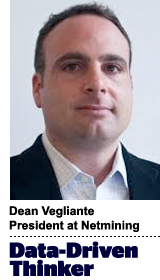 “Data-Driven Thinking” is written by members of the media community and contains fresh ideas on the digital revolution in media.
“Data-Driven Thinking” is written by members of the media community and contains fresh ideas on the digital revolution in media.
Today’s column is written by Dean Vegliante, president at Netmining.
Whenever the press talks about programmatic advertising, most of the attention is focused on major holding companies and their trading desks. While holding companies have been instrumental in programmatic’s adoption, they only represent one segment of brand-agency relationships. There are dozens of independent ad agencies across the country that don’t command big headlines, yet they have strong, loyal relationships with large-scale advertisers.
As programmatic adoption increases, it is these agencies that will become the tip of the spear, helping educate their clients – both large and small – on what’s possible with programmatic. For programmatic to continue double-digit growth and account for two-thirds of the display marketplace by 2019, as recently forecast, these agencies will need to both drive advertiser adoption and continue pushing for programmatic innovation, even though they won’t own the technology themselves.
These are shops that have lots of great clients, including those in the Fortune 500, who remain loyal to their agency thanks to long-term relationships. Instead of campaigns in excess of $10 million, these agencies may have carved out a sweet spot helping several clients run smaller but still sizable campaigns. These agencies are in no danger of disappearing, but they lack the size and budget to build internal programmatic arms to increase their revenue. They need to adopt programmatic capabilities so that they can continue to help their clients reach consumers across new media channels.
Many independent agencies also lack the time and expertise to test and leverage various programmatic solutions. The education gap varies, but in some cases, it’s as extreme as agencies that once specialized in print advertising and must now adopt programmatic to maintain pace with consumer media habits.
The rise in programmatic consultancies can surely help these agencies make decisions, but many need to get much closer to the technologies. They may not have a programmatic director, but they need some sort of dedicated resources, either in-house or outsourced support, that can act as their programmatic guides and drive growth. These types of efforts would have a ripple effect across the programmatic ecosystem, for the better.
While technology is not a core strength for many of these agencies, customer service and familiarity with the brands they serve are what help them maintain loyal client bases. This close proximity to their clients will give these agencies a very clear sense of what the individual brands need from programmatic. They’ll know their campaign goals, targets and what has historically worked for the brand, in terms of messaging.
This should inspire a competitive market aimed at serving smaller agencies. At minimum, it will force every platform to stay current by releasing products and investing internally in their solutions.
By forcing programmatic platforms to adapt to their needs, agencies that fall a tier beneath the holding companies will be the ones responsible for maintaining innovation in programmatic. Rather than try to navigate the technology on their own, these agencies can focus on what defines them, in their clients’ eyes, and work together with the clients and the tech providers to develop programmatic strategies that work for everyone involved.
Follow Netmining (@Netmining) and AdExchanger (@adexchanger) on Twitter.
This post was syndicated from Ad Exchanger.

More Stories
Third-Party Cookies Will See Their End, No Matter The Timeline
SCPI launches Mind Control initiative to tackle pet persuasion
Fanta’s Famous Jingle Is Back With New ‘Wanta Fanta’ Remix